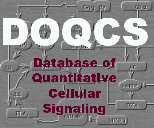
|
Enter a Search String | | Special character and space not allowed in the query term.
Search string should be at least 2 characters long. |
Molecule Parameter List for Lambda-cl | The statistics table lists the distribution of a molecule acting either as a substrate, product, enzyme or as a molecule within the network.
The text color of a molecule is highlighted by  color. color. | | Statistics |
Accession and Pathway Details | |
Lambda-cl acting as a Molecule in Repressilator Network
| Name | Accession Name | Pathway Name | Initial Conc.
(uM) | Volume
(fL) | Buffered | | Lambda-cl | Repressilator
Accession No. : 68 | Lambda-cl_gene
Pathway No. : 295 | 0 | 3 | No | | Lambda-cl translated from lcl m-RNA Derived from Figure 1(c) stochastic version Elowitz, M. et al. (2000) Nature 403:335-338 |
Lambda-cl acting as a Product of an Enzyme in Repressilator Network
Enzyme Molecule /
Enzyme Activity | Accession Name | Pathway Name | Km (uM) | kcat (s^-1) | Ratio | Enzyme Type | Reagents | lambda-cl_mRNA /
lambda-cl_
translation
| Repressilator
Accession No. : 68 | Lambda-cl_gene
Pathway No. : 295 | 0.000555595 | 0.167 | 4 | Classical Michaelis-Menten
V = Etot.S.Kcat/Km+S | Substrate
Amino_Acids
Product
Lambda-cl
| | Translation the lambda cl mRNA. Rates from Box 1 Elowitz, M. et al (2000) Nature 403:335-338 |
Lambda-cl acting as a Substrate in a reaction in Repressilator Network
| Kd is calculated only for second order reactions, like nA+nB <->nC or nA<->nC+nD, where n is number and A,B,C,D are molecules, where as for first order reactions Keq is calculated.
Kd for higher order reaction are not consider. |
| | Name | Accession Name | Pathway Name | Kf | Kb | Kd | tau | Reagents | | 1 | Lambda-cl_
degradation | Repressilator
Accession No. : 68 | Lambda-cl_gene
Pathway No. : 295 | 0.0167
(s^-1) | 0
(s^-1) | - | - | Substrate
Lambda-cl
Product
Degraded_
Lambda-cl
| | | This reaction denotes the degradation of Lambda cl the half life of which is ten minutes. t1/2 = 0.693/k where k denotes kf Note: Rates had to scaled by approx 1.4 to get desired levels Elowitz, M. et al. (2000) Nature 403:335-338 | | 2 | Lac_operator_
inhibition_
reaction | Repressilator
Accession No. : 68 | Lac_gene
Pathway No. : 296 | 1000.01
(uM^-1 s^-1) | 224
(s^-1) | Kd(bf) = 0.224(uM) | - | Substrate
Lac_operator
Lambda-cl
Product
Lac_operator_
1st_bound
| | | It signifies the first binding of the repressor with the operator Kf = 1 /nM/sec Kb = 224 /sec Box 1 Elowitz, M. et al. (2000) Nature 403:335-338 | | 3 | Lac_operator_
inhibition_
reaction[1] | Repressilator
Accession No. : 68 | Lac_gene
Pathway No. : 296 | 1000.01
(uM^-1 s^-1) | 9
(s^-1) | Kd(bf) = 0.009(uM) | - | Substrate
Lac_operator_
1st_bound
Lambda-cl
Product
Lac_operator_
2nd_bound
| | | It signifies the second binding of the repressor with the operator Kf = 1 /nM/sec Kb = 9 /sec Box 1 Elowitz, M. et al (2000) Nature 403:335-338 |
| Database compilation and code copyright (C) 2022, Upinder S. Bhalla and NCBS/TIFR
This Copyright is applied to ensure that the contents of this database remain freely available. Please see FAQ for details. |
|
